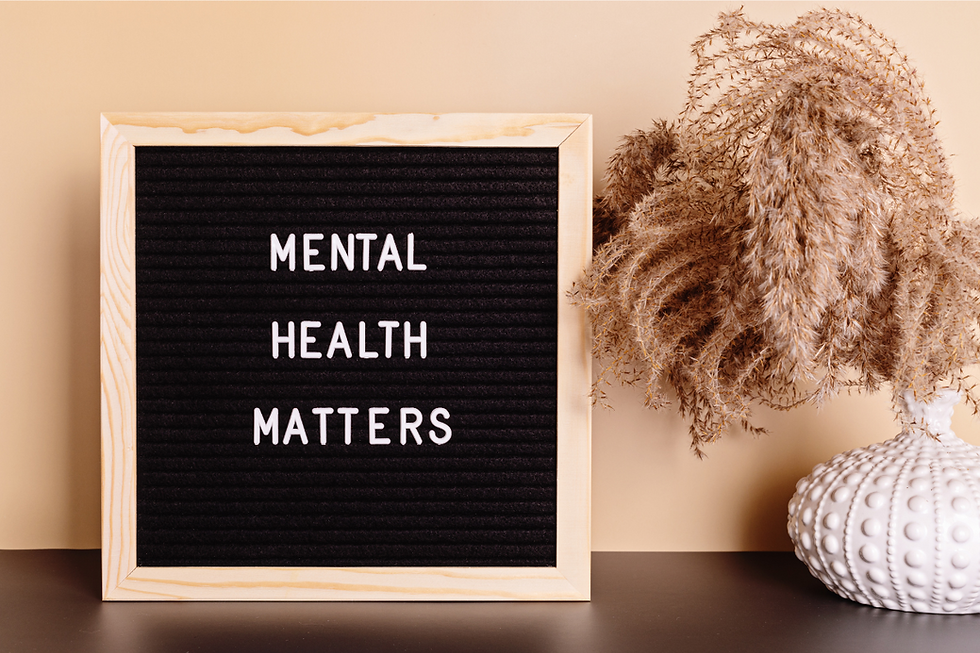Mind Matters: Boosting Mental Fitness at Work
- Lauren Lyman

- Oct 13, 2025
- 3 min read

In today’s fast-paced workplace, stress is inevitable, but how we manage it makes all the difference. According to recent workforce studies, more than 80% of employees report feeling stressed at work, and nearly half say stress negatively affects their performance and relationships. The good news? With the right tools, we can strengthen mental fitness just like physical fitness, and build resilience that carries us through challenges both inside and outside of work.
Our recent Mind Matters training provided practical strategies to strengthen resilience, improve focus, and create a healthier work environment. Here are some of the key lessons from our workshop.
What is Mental Fitness?
Mental fitness is the ability to stay clear-headed, balanced, and adaptable under stress. Just as we train our bodies to be physically fit, mental fitness involves daily habits that prepare the mind to respond to challenges instead of being overwhelmed by them.
Strong mental fitness allows employees to:
Recover more quickly from setbacks
Stay focused and productive even under pressure
Build stronger, more positive workplace relationships
The Four Core Components of Mental Fitness
Resilience: The capacity to bounce back after difficulties. For example, a resilient employee might treat a missed deadline as a learning opportunity instead of a failure.
Emotional Regulation: Managing stress responses rather than letting them control you. Taking a pause before responding to an upsetting email is a simple but powerful example.
Self-Awareness: Recognizing your own triggers and patterns. Do you tend to “shut down” during conflict, or push harder? Awareness is the first step to change.
Adaptability: The ability to adjust to new expectations, processes, or priorities. Adaptable employees thrive in change instead of resisting it.
Identifying Triggers and Responses
Everyone has stress triggers: tight deadlines, unclear communication, competing priorities. When triggered, we often fall into four instinctive patterns: fight, flight, freeze, or fawn. For example:
A “fight” response might look like snapping at a coworker.
A “freeze” response could be procrastinating because you feel stuck.
Recognizing your patterns allows you to choose a different, healthier response next time.
Tools to Strengthen Mental Fitness
Building mental fitness doesn’t require a major lifestyle overhaul. Small, consistent practices have a big impact:
Breathwork and microbreaks to reset in the middle of a stressful day
Mindfulness and gratitude journaling to shift your perspective toward the positive
Reframing challenges by asking, “What else could be true here?”
Setting boundaries to protect time, focus, and well-being
Applying Mental Fitness at Work
Workplaces that prioritize mental fitness see stronger teamwork, higher engagement, and reduced turnover. Managers and employees alike can help normalize mental health conversations by:
Encouraging open dialogue about workload and expectations
Building in moments of recovery, such as brief breaks between meetings
Checking in with colleagues not just about tasks, but about how they’re doing
The Mental Health Toolkit
At Premier HR Solutions, we encourage employees to build a personal toolkit to support mental fitness. A few ideas include:
Daily practices like journaling, meditation, or a 10-minute walk
Workplace strategies such as blocking focus time or asking for clarity when expectations feel unclear
Apps and resources like Headspace, Calm, or Mental Health America’s online tools
A Commitment to Growth
The Mind Matters training ended with one important takeaway: pick one strategy and try it this week. Write it down where you can see it. At the end of the week, reflect on how it impacted your energy, focus, or relationships.
Small steps practiced consistently create lasting change, for individuals and for workplace culture.




Comments